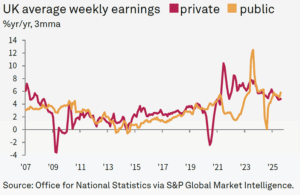“What’s the UK job market like?”
The November 2025 KPMG & REC UK REPORT ON JOBS has been published featuring survey results from mid/late October.
The full report is posted here
Jon Holt, Chief Executive and Senior Partner of KPMG in the UK commented:
“ Economic uncertainty continues to weigh heavy on business, but further stabilisation in the jobs market last month indicates that a Budget that builds business confidence, could be a catalyst for renewed hiring….there just aren’t enough strong signals currently for bosses to commit to building their workforce on a more permanent basis”
Neil Carberry, REC Chief Executive, said:
“Today’s data reflects the more positive outlook we have been hearing from recruiters since the start of the autumn. But we have been here before….the huge surprise increase in payroll taxes …. shocked the market and we have seen the results of that, as businesses predicted then, in higher unemployment and redundancy.…. ”
Key UK job market findings are:
- Fresh rise in temp billings, while perm placements fall at slower rate
- Vacancies continue to fall sharply
- Further substantial increase in supply of candidates
- Pay pressures remain weak
- ONS vacancy figures the lowest recorded in nearly four-and-a-half years
- All bar one sector declined and the steepest reduction in vacancies were once again seen in the Retail and Hotel & Catering Categories
- Permanent staff appointments fell across all four English regions with the sharpest reduction seen in the North of England, with the slowest in London.
Appointments
Decline in permanent placements moderates again in October
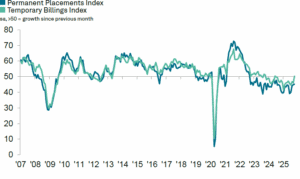
As has been the case since October 2022, permanent staff appointments across the UK declined at the start of the final quarter of 2025. That said, the rate of reduction eased for the fourth straight month and, though marked, was the softest seen since July 2024.
Where lower placements were reported, recruiters frequently linked this to uncertainty around the economic outlook and upcoming government Budget, which often led employers to delay recruitment plans.
Greater staffing costs – most notably from higher National Insurance contributions (the so-called “tax on jobs”) – had also impacted hiring decisions, according to panellists.
Permanent staff appointments declined across all four monitored areas of England, with the North of England seeing the steepest rate of contraction.
Vacancies
Demand for staff continues to weaken
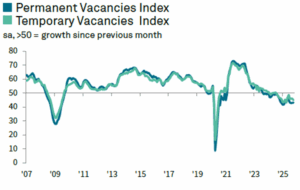
A further reduction in demand for staff. Overall vacancies have now fallen throughout the past two years.
Permanent & temporary vacancies
Data broken down by job type signalled further marked falls in demand for both permanent and temporary workers at the start of the fourth quarter. Permanent vacancies continued to fall at a steeper rate than that seen for temporary staff, despite the latter seeing the most pronounced contraction for six months.
Public & private sector vacancies
Recruiters indicated a broad-based reduction in staff demand across both the private and public sectors. The public sector recorded the quickest reduction in vacancies for both permanent and temporary workers. The softest decline in vacancies was meanwhile signalled for temporary workers in the private sector.
Vacancies by Sector
Demand for permanent workers increased across the Accounting/Financial and Engineering sectors in October but fell elsewhere. The steepest reductions in permanent vacancies were once again seen in the Retail and Hotel & Catering categories.
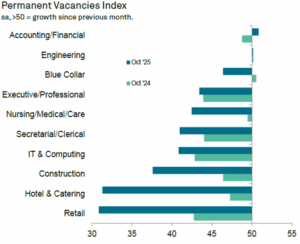
ONS Data
Office for National Statistics Recent labour market figures from the Office for National Statistics (ONS) showed that total vacancies continued to fall in the three months to September. However, the drop of 9,000 was the smallest since the period up to February.
Even so, the ongoing decline in hiring demand brought vacancies down to 717,000 — the lowest level in almost four and a half years and nearly half what it was in Q2 2022.
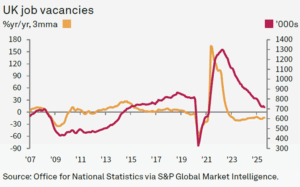
Staff availability
Availability of workers continues to rise at robust pace
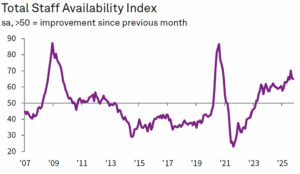
The seasonally adjusted Total Staff Availability Index stood at 65.0 in October, down slightly from 65.4 in September, yet still well above the neutral 50.0 mark, indicating a strong rise in the number of people looking for work. The figure also remained among the highest recorded since late 2020, when the pandemic led to a sharp surge in candidate supply.
Overall availability has now increased for 32 consecutive months, with notable growth in both permanent and temporary labour pools.
Recruiters were around four times more likely to report an increase in permanent candidate availability (41%) than a decline (10%), with the latest rise linked to redundancies and a slimmer pool of vacancies. Although the pace of growth eased for the second month running, it was still among the fastest seen since late 2020.
All English regions except London recorded a gentler increase in permanent candidate numbers.
Pay pressures
Starting salary inflation remains marginal in October
Pay for newly hired permanent staff in the UK continued to rise at the beginning of the final quarter. Although the pace of growth edged up slightly from September’s more than four-year low, it stayed modest and well beneath the long-run trend.
Many recruiters noted offering higher salaries to attract strong talent, though others reported pay holding steady or even slipping because of softer market conditions and tighter employer budgets.
Starting salaries increased in London and the Midlands but declined in both the North and South of England.
ONS Data
According to the latest data from the Office for National Statistics (ONS), figures showed another year-on-year rise in average weekly pay during the three months to August. Growth reached 5%, a touch higher than the 4.8% recorded in the three months to July, and strong by historical standards.
The public sector played a major part in this pickup, with pay rising 5.8% compared with a year earlier. In the private sector, earnings growth also edged up, reaching 4.8% over the same period.
London job market
KPMG and REC also produce a London job market analysis.
Moderate yet continued drop in permanent hiring numbers
October saw another fall in permanent hires across London. The rate of decline was firm, though less sharp than in September. Recruiters who reported reductions generally pointed to a shortage of available roles.
All four English regions tracked experienced notable drops in permanent placements, but London registered the mildest downturn.
Job vacancies
Recruiters in London again reported a drop in permanent vacancies during October, continuing the trend seen since August 2024. The decline eased only marginally from September’s recent peak and remained significant.
Demand for temporary staff also weakened at the beginning of the final quarter. The fall in temp vacancies was steep, representing the fastest contraction in six months.
Both permanent and temporary vacancy numbers declined at a quicker pace than the corresponding UK-wide averages.
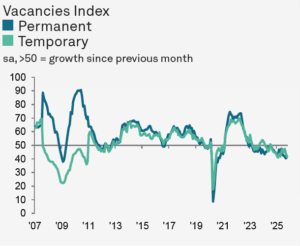
Redundancies fuel sharp rise in permanent staff supply
Once seasonal factors were accounted for, October’s Permanent Staff Availability Index showed a clear rise, indicating a strong increase in the number of permanent jobseekers in London. Redundancies were again the main reason cited for the uplift. Supply has now been growing for almost three years.
London was also the sole English region to record a faster rise in permanent candidate availability during October.
Starting salary inflation slowest for a year
October saw an uplift in starting pay for new permanent hires in the capital. Recruiters who reported increases linked them to senior appointments and the need for more specialist skills. Even so, the pace of salary growth slipped to its lowest point in a year and was generally modest, with some firms focusing on cost control.
Among the four regions assessed, only the Midlands also registered a rise in permanent starting salaries.
Regional comparison
Staff appointments
Permanent hires fell again across the UK in October. The decline was firm but the mildest since July 2024. All four English regions recorded lower permanent appointments at the start of the fourth quarter, with the North of England seeing the steepest drop and London the smallest.
UK recruitment firms reported a rise in temporary billings in October, the first increase since June 2024. However, growth was slight overall, supported by a strong upturn in the Midlands and a modest rise in the North of England. Temp billings continued to contract in London and the South, though at far gentler rates than before.
Candidate availability
The supply of candidates for permanent roles rose again across the UK in October. Although the pace of growth was the slowest in three months, it remained strong overall. All four English regions saw increases, with the South recording the fastest rise and the Midlands the most moderate.
October also showed a solid rise in the number of people available for temporary work, though the rate of expansion eased for the second consecutive month and was the weakest since July. The Midlands and London reported sharper growth in temp availability, while the North and South posted slower but still significant increases.
Pay pressures
The latest figures showed only a slight rise in starting pay at the UK level, with the pace of growth remaining well below the long-term norm. This was despite a small pick-up from September’s multi-year low. Among the four English regions, London and the Midlands noted gentler increases, while both the North and South recorded further declines in starting salaries.
Hourly pay for temporary workers edged down across the UK at the beginning of the fourth quarter, ending a year of continuous growth. As with permanent pay, the North and South of England saw reductions in temp rates during October, while wage inflation eased in both London and the Midlands.
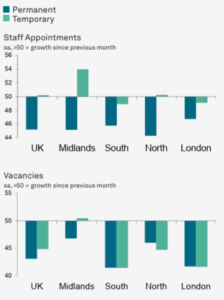
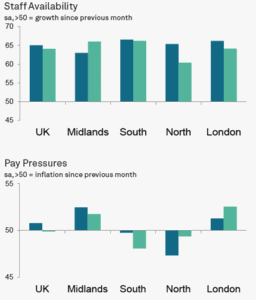
The Prism Executive Recruitment perspective: management consultancy recruitment
The Decline in the Management Consulting Job Market
The job market in management consulting has declined significantly since the end of 2022. Indeed since mid-2023, the Big Four and other leading consultancies, including typically resilient strategy firms, have publicly announced redundancies. Numerous smaller firms have been quietly reducing their permanent teams or associates.
At present, few consulting employers have sufficient vacancies to absorb the large number of unemployed management consulting professionals.
In May 2024, headlines highlighted “PwC asks for silence from departing staff in programme of UK job cuts,” signalling another significant round of voluntary redundancies.
In June, it was reported that “Consultants to lose £3bn of UK government work under plan to halve advisory spend.”
By July 2024, the Financial Times noted, “UK consultant numbers shrink as companies cut back on external advice. Headcount fell 3% last year with firms axing jobs and moving staff as post-pandemic boom fades.”
In October, “Deloitte axes 250 UK employees in performance-related cull.” and in December “Deloitte accelerates UK layoffs with fresh redundancy round”.
EY meanwhile in December 2024 stated “Regrettably, proposals put forward in part of the UK consulting practice may result in a reduction of 150 roles”
Reasons for the Downturn:
- Overly Optimistic Hiring and pay rises in 2022: Many firms hired extensively, dangling salary increases which have added to costs, expecting sustained growth that ultimately did not materialise.
- Economic Slow Down since: The consultancy sector is highly responsive to economic shifts and even a mild downturn can prompt hiring freezes and lead to subsequent redundancies.
- Cautious Expansion: Although many firms continue to perform reasonably well, ongoing uncertainty has made them hesitant to increase their headcount.
- Sector Growth Slowing: in January 2025: a survey among the member-firms of the Management Consultancies Association reveals that many expect revenue expansion to be just 6.4% in the coming 12 months, the lowest rate since 2020.
- With no sign of a turnaround: here from early May 2025 “PwC to slash 1,500 US jobs” while in March “PwC cuts record number of UK partners and halts tech apprenticeship scheme”.
Other indicators
In related news:
- The latest NatWest UK Regional Growth Tracker published 11 November 2025 “showed improved performances in a number of areas of the UK as the country entered the final quarter of 2025. Firms continued to report employment pressures but the number of regions reporting upturns in hiring was at its highest level in almost 12 months. ”
- The S&P Global UK Services Purchasing Managers’ Index (PMI) from November 2025 states: “Business activity expanded for the sixth consecutive month in October, with growth momentum strengthening considerably since September, helped by improved demand conditions. Survey respondents cited a gradual turnaround in new work and sales opportunities, despite elevated business uncertainty and delayed decision-making among clients.”
- The S&P Global UK Manufacturing Purchasing Managers’ Index, also November, states: “UK manufacturing output expanded for the first time in a year during October, as companies depleted backlogs of work, increased stocks and, in some cases, were boosted by a restarting of production at JLR following a recent cyberattack.
- The Lloyds Bank Business Barometer from October 2025 states “At the start of the fourth quarter, firms reported a more optimistic outlook for both their own trading prospects and the broader economy. The improvement, especially in trading expectations, reversed much of September’s decline in the headline index.”
- The BDO Business Trends from November 2025 states “The UK economy picked up in October as the Output Index rose to 97.49, up from 96.25 in September. This marks its largest monthly improvement since December 2024. Both the services and manufacturing sectors contributed to October’s rise, with easing cost pressures such as lower-than-expected inflation, which in turn increased domestic demand driving improvement in services output. ”
- The IoD Directors’ Economic Confidence Index, from 1 November echoes the widespread pre-budget gloom which was of course a feature of the latter part of 2024: “[Index] remained at historic low levels of -73 in October 2025, little changed from -74 in September, which was the lowest reading of the Index on record”
- In November Reed’s job market review reported: “In October, 113,731 jobs were posted — a 2% month-on-month (MoM) increase — signalling steady growth in the job market but significantly below the 160,378 jobs posted in March 2024”
- While the CIPD’s Autumn Labour Market Outlook states “The labour market in the UK is cooling. Recruitment pressures are easing on employers and wage growth across large swathes of the economy is falling.”
- The Page Group, very much an economic bellwether in professional and executive hiring, issued a trading update in October 2025 “Group gross profit of £187.8m -6.7%* vs. 2024…. Resilient performance despite market uncertainty, variable results across the Group”
- The REC’s Labour Market Tracker, which reviews job postings, updated in September, shows a level comparable with August 2024.
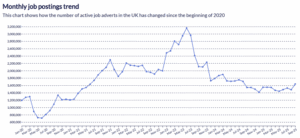
- The most recent quarterly ManpowerGroup Employment Outlook Survey , on the state of the labour market globally at the start of Q4 2025 puts the UK firmly towards the bottom with regard to hiring expectations.
Methodology
The KPMG and REC UK Report on Jobs is compiled by S&P Global from responses to questionnaires sent to a panel of around 400 UK recruitment and employment consultancies.
For more information on the job market, or to discuss your hiring or career plans please contact Chris Sale, Managing Director, Prism Executive Recruitment via [email protected]
